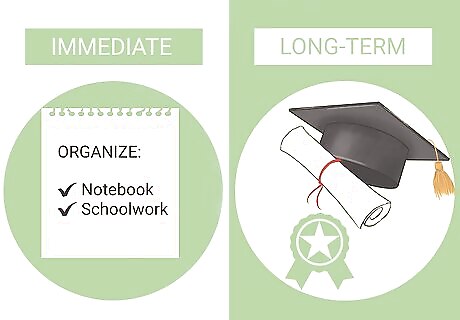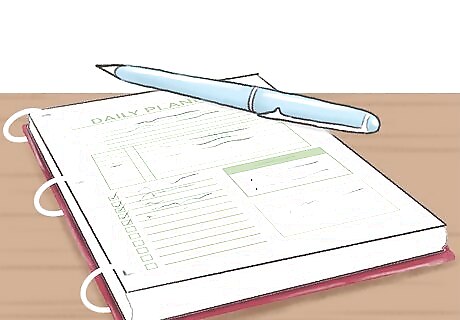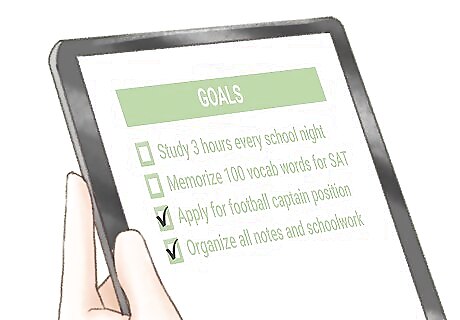
views
Getting in the Right Mindset

Write down all of your goals. You don’t have to think of realistic or precise goals just yet. Begin by writing down any goal that comes to mind. For example, write down “make captain of the football team.” Even if you aren’t sure it’s a realistic goal, it’s okay to write it down at this point. You can narrow down your goals later. Write your goals on a poster and stick it above the desk that you look at each day.

Create precise goals for yourself. You may be excited and making all kinds of goals, but it’s better to pace yourself once you’ve written your initial goals down. Choose specific, realistic goals or even one single but very important goal. When it comes to choosing your goal, ensure that it states precisely what it is that you want to achieve. Write these down in a journal and keep it with you at home and school. For example, instead of saying you want to study more, say that you want to study for three hours every night during the school week.

Think of immediate and long-term goals. Now that you’ve written down specific goals, separate them into either immediate or long-term goals. An immediate goal would be to organize all of your notes and schoolwork. A long-term goal would be to make honor roll at then end of the year. Keep the immediate and long-term goals on separate pages.

Make deadlines for your goals. There are certain things you won’t be able to set deadlines for, like final tests and tryouts for teams. But, you do need to make deadlines for goals that don’t have set dates. For example, if you want to learn a certain amount of vocabulary words for the SAT, set a number for a specific date. Write down that date in your notebook and keep it in mind as the year progresses. It’s also helpful to write down the dates of things that are out of your control, like final tests.

Start with a positive attitude. Seeing all of your goals written down can be overwhelming. A positive attitude is essential when it comes to achieving your goals. You can maintain a positive attitude by thinking of the positive things that happen in your day, considering your strengths, and remembering that everyone has a bad day sometimes. Write down your thoughts and feelings in a journal in a positive way. For example, instead of writing “Stop failing vocabulary quizzes,” you can write “Improve grades on vocabulary quizzes.” Be open with a friend or family member about your feelings and worries.
Working towards Your Goals

Get organized. Getting organized will make it easier to stay on top of achieving your goals. Organize your backpack, locker, notebooks, and anything else that holds your schoolwork or other paperwork. Determine what you need and get rid of the junk. Keep your things organized throughout the school year. Spend 10 minutes on organization when you get home from school every day.

Don’t procrastinate. It’s easy to get distracted and do something that sounds like more fun than work. A little bit of procrastination is normal, so don’t get mad at yourself if it happens. Instead, work on overcoming procrastination. Do things like prioritizing your tasks, starting with the hardest task, and breaking your tasks down into 15 minute chunks. Set small periods of time each week for TV and internet use that isn't for research purposes. Don't allow these times to bleed into study time or to replace it.

Attend every class. Skipping classes will only prevent you from achieving your goals. Try to never skip class unless it is for a good reason, like sickness. Take every class seriously and take notes. If you do miss class, ask your teacher and schoolmates what you missed.

Ask questions when you need help. It’s normal to struggle with something at some point in school. Even if you’re not struggling, be curious and ask questions. This will help you learn more and be prepared to take on your goals. Ask for extra help from a tutor or parent if you find that you aren’t understanding something on your own. Ask the question to your teacher after class if you’re not comfortable raising your hand in class.

Use a planner. Keep a personal planner with you at all times. Buy a planner that includes the dates you will be in school and has enough room to write things down. First, write down all of the permanent due dates. Then, write down your daily assignments and weekly goals. Keep up the planner for the rest of the year. You can also keep a calendar on your wall.
Staying on Track

Reward yourself for your progress. Occasionally, when you've achieved certain milestones in your goal plan, take a break and reward yourself. See a favorite movie, visit a friend who lives across town, go to the ice cream parlor with your friends, or buy yourself something new. If you don't have the money to purchase rewards for yourself, find ways to reward yourself that don't cost anything. This can include setting aside a favorite game or activity only for when you earn it.

Overcome mistakes. You are going to make mistakes during the process of achieving your goals. That is completely normal and expected. Even if it’s not you making a mistake, you’re going to encounter some kind of obstacle. Don’t let these problems overwhelm you. Gather your thoughts, readjust your efforts, and maintain a positive mindset. Break down your goals into smaller chunks if you find that your initial list was not possible.

Create new goals halfway through the year. Once you’ve gone through the first part of the school year, make a list for the second half. You may have some goals that you haven’t accomplished yet, and that’s okay. Put those goals at the top of your new list. Write down a few other realistic and manageable goals.

Reflect on your progress. At some point during the year, you will need to evaluate your progress. Think of what you’ve accomplished so far. You should also consider what you need to work on. Once you’ve done that, you can figure out what you need to do to get better as the year goes on. You can review your progress halfway through the year, or do it once a month.

Get enough sleep. Sleep is very important, especially when you’re keeping up with a busy school schedule. Don’t overwhelm yourself so much that you lose out on sleep. Try to maintain a sleeping schedule. Go to bed at the same time every night and get at least eight hours of sleep. Avoid caffeine and other stimulants, like television screens, before you go to bed.

Find ways to relax. Hard work is necessary but so is relaxation. Overwhelming yourself can lead to exhaustion and mood problems, which could prevent you from achieving your goals. Do things like sports, meditation, or writing to help you relax. Exercising can also help you sleep better.



















Comments
0 comment